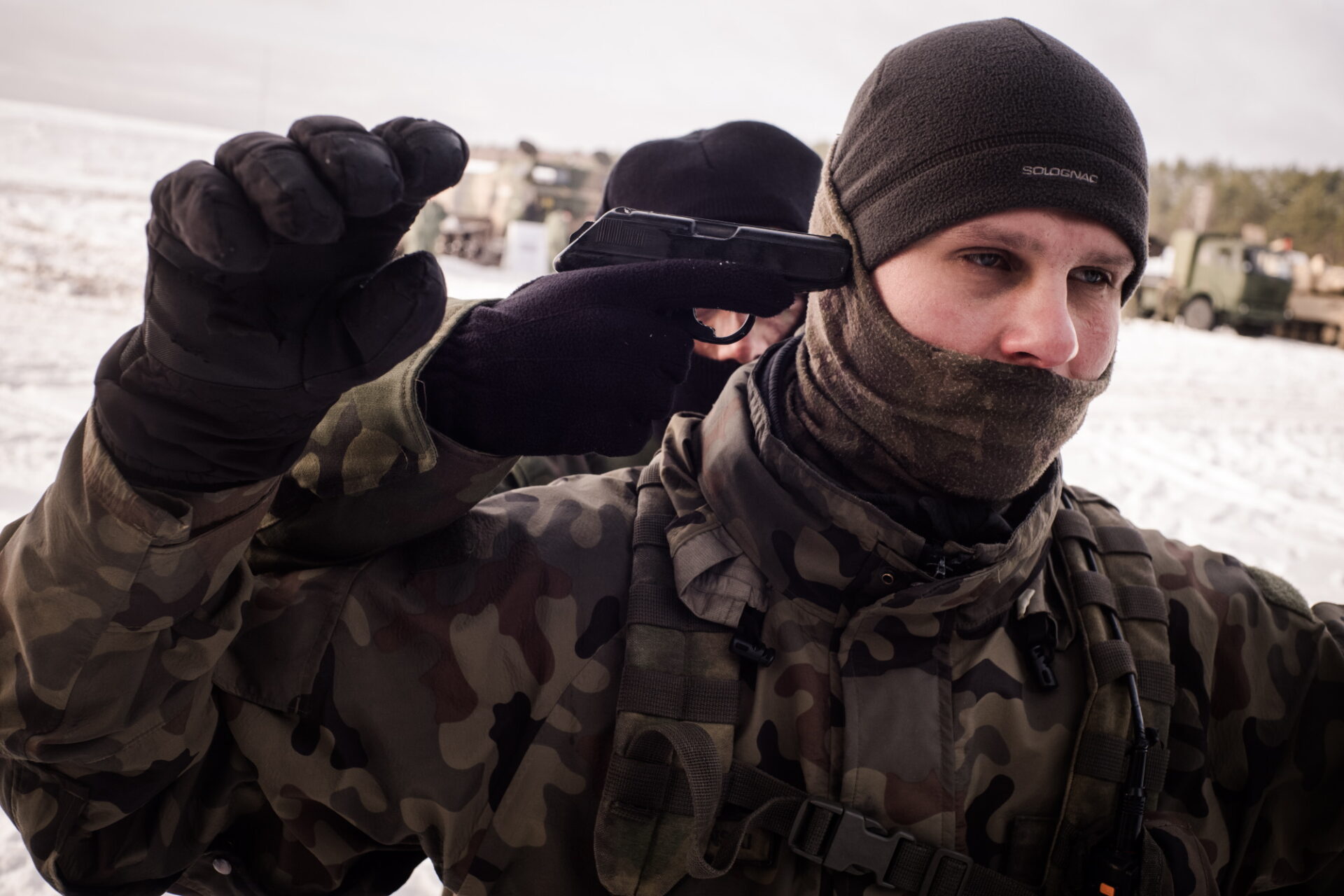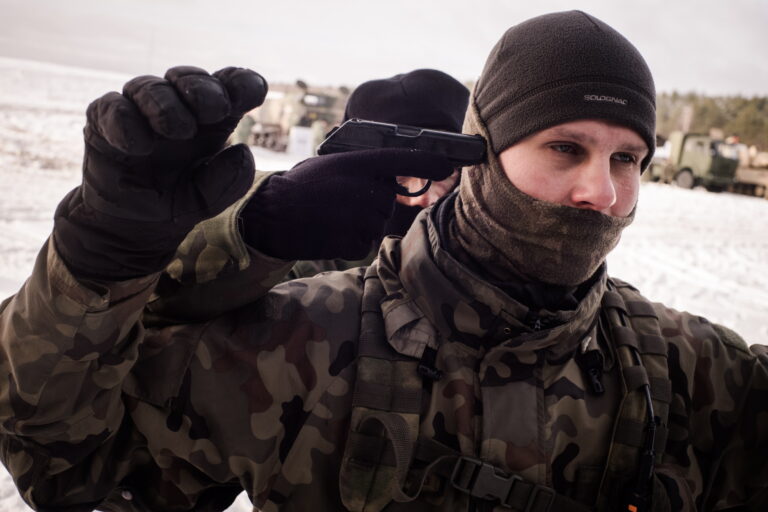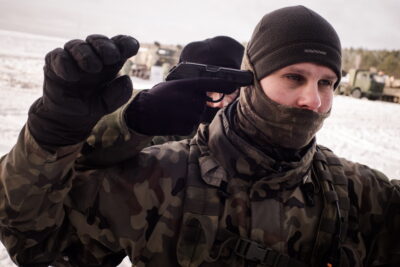Drills, military-like rules and shooting exercises plus classes in civic values and patriotic conduct. These are some items on a curriculum for uniformed classes certified by the Polish ministry of defense. It has been adopted by more than a hundred Polish schools, and 50 thousand students come to school wearing uniforms. Their upbringing is not only in the hands of teachers, but also members of pro-defense organizations, soldiers and even military chaplains.
In August 2017, Michał Dworczyk, the then deputy minister of national defense sent out a curriculum for the subject military education to secondary schools. But it was not only about that subject. The deputy minister’s project was much broader and designed to build up a network of hundreds of schools in Poland which would collaborate very closely with the army, shaping and training young people in almost the same way as soldiers are trained. This is how a controversial pilot program of certified military classes was started, initially joined by 57 schools. Today, there are already 107.
The program is carried out under the auspices of ministry of defense’s Office for Pro-Defense Organizations. The institution, led by Waldemar Zubek, has developed and prepared details of the document. Interestingly, the authors of the program include not only MOD officials, but also people from pro-defense organizations, eg. Jacek Klimanek, connected with the association Obronanarodowa.pl and Damian Duda of Academic Legion. As pointed out in a recent report by the Supreme Audit Office (Najwyższa Izba Kontroli, NIK), the two organizations are also the beneficiaries of ministry of defense subsidies for the training of young people in uniformed classes.
The NIK report also clearly states that the greatest beneficiaries of the pilot program for uniformed classes were the pro-defense organizations themselves. But this is not the end of questions. The Supreme Audit Office found that the funding from national budget of shooting training for the students of military classes was ineffective and uneconomical. ‘60 munitions per person are allotted for this training, and ammunition for pro-defense organizations is provided free of charge (250 munitions per person), whereas the number of cartridges available for a one-off training of a regular soldier is six!’
The auditors noted that members of the organizations first trained for free in military units, using army infrastructure and equipment, and then they commercially trained the students of uniformed classes, for money from the budget of the ministry of defense. NIK indicates two of such organizations: FIA association and Szturman foundation.
FIA draws particular attention, as it rakes in the most money from the MOD and is closely linked to the current government. It also gets most contracts for the training of young people in uniformed classes. Members of the association include former soldiers, scouts and military enthusiasts. On its website, you can find photos and videos showing members of the organization pose in the company of the former defense minister Antoni Macierewicz.
Ministry of defense’s pilot program for uniformed classes is very ambitious. Actually, even some military units would not be ashamed of it. It starts with shaping patriotic attitudes in young people, such as respect for the homeland, symbols and knowledge of Polish military history. The students are given propaganda talks, served in a patriotic sauce. These can be given by teachers, based on guidelines provided by the MOD, as well as soldiers, military chaplains and even members of pro-defense organizations. Meanwhile, members of this latter group include people with extreme, even nationalistic views. It therefore comes as no surprise that the matter is controversial.
‘This program is intended for only one vision of patriotism, a vision that is close to the far right. Anyone who does not share those views, becomes the enemy. This is not building community and openness’ says Joanna Kluzik-Rostkowska, today a member of the Civic Platform, who was once a minister of education.
After the ideological introduction to the program, there come the basics of military studies, such as the principles of hierarchy and discipline. In the end, the time comes to test the physical fitness of young people. The program includes ‘learning selected aspects of self-defense and close combat’ and ‘strengthening the psychophysical resilience in young people’.
‘I once was an instructor at a camp for uniformed classes. I saw tired, even exhausted young people who lived in tough conditions for several days’ says an ex-soldier who briefly collaborated with the FIA association. Some of the training methods used by other instructors at the camp raised his objections. ‘For me, that was one last drop of bitterness. I didn’t take part in the uniformed classes training anymore, even though I got an offer, and for good money’.
In such camps and in military units, young people are expected to learn military tactics, to parade in a marching formation, patrol, throw dummy grenades, prepare action on the battlefield, operate from combat vehicles, carry out reconnaissance, mask people, weapons and equipment. There is also communications, logistics and battlefield medicine.
Students come into contact with arms too. Initially, they learn how a gun is built and the rules of using it, then they get it into their hands. And, as we already know from the SAO report, they get ten times more ammunition than a regular soldier.
The training lasts for a year and a half, and ends with a military oath. Students of the uniformed classes automatically become reservists of the Polish army. In theory, they also have better chances of finding a job in the army or getting to military universities. It is a well-known fact, however, that not all of them will go there because of the limited number of jobs as well as budgetary constraints. So the question arises: what about the rest of them? Already today, they are a huge army of young people well-trained in using weapons, with heads full of patriotic ideals. If they cannot fulfill their passion, where can they give vent to frustration?
The Polish Ministry of National Education strongly distances itself from the project. ‘The program is carried out by the MOD; if a school decides to take part in this innovation, the school principal is accountable and pedagogical supervision over any school is with the territorially competent schools superintendent’ – was the answer that came from the ministry’s press office when we asked who controls and supervises the military classes. Nevertheless, schools are trying to outdo one another to join the program. It is hardly surprising. The MOD declares funding for the classes, provides a training base, equipment and training grounds, and offers free transportation for students to get to field classes. However, it rests with the schools to take out accident insurance for their students.
The phenomenon of Polish uniformed classes has recently interested the BBC, which prepared a report about one of such classes in Nowy Sącz. Among other things, the material showed students’ military exercises, training with guns, drills and field maneuvers. One of the characters declares that ‘patriotism is her life’. According to BBC reporters, militaristic sentiment is on the rise in Poland as a result of ‘electing a conservative government and the continuous state of tension with Russia’.
This article is a part of a research supported by the IJ4EU grant. The IJ4EU fund is not responsible for the content and any use made out of it

Polish journalist, since 2016 working for onet.pl. Former journalist at Rzeczpospolita daily and editor-in-chief of Polska Zbrojna, war correspondent in Afghanistan. Based in Warsaw.






